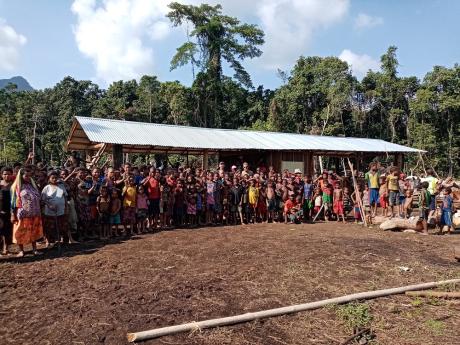Because of MAF's air service, remote communities can "invest in people, and prioritise education," - as is this year's theme of the International Day of Education, celebrated on 24th January
Celebrating year 10 graduation for the very first time
“What a great day it was to be present for the 10th-grade graduation ceremony at Nomad-Mougulu High School,” states MAF PNG Country Director Todd Aebischer who was a guest of honour at the school’s very first year 10 graduation in 2022.
He continues: “MAF has been partnering with the Strickland-Bosavi Foundation and the Hoey Family for years as they have grown this school to what it is today. It is truly inspiring to hear that 22 of their 54 graduates were accepted to continue their education on the basis of scholastic merit! This speaks volumes about the quality of education being provided at this school! To Sally, Ian, and the entire Nomad-Mougulu High School Team and Students - keep up the great work!”
Nomad Mougulu Highschool in Western Province is one of the many rural schools on mainland PNG, relying on MAF’s air service to operate. Let it be teachers, food, pens and exercise books, chalk and textbooks, roofing iron, steel posts, nails, timber, etc., even exam papers – everything needed to build and operate a school gets flown by our aircraft.
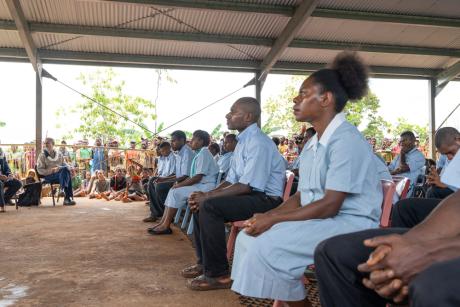
Education is a human right, a public good and a public responsibility.
The United Nations General Assembly proclaimed 24 January as the International Day of Education, in celebration of the role of education for peace and development.
Without inclusive and equitable quality education and lifelong opportunities for all, countries will not succeed in achieving gender equality and breaking the cycle of poverty that is leaving millions of children, youth and adults behind.
Today, 244 million children and youth are out of school, and 771 million adults are illiterate. Their right to education is being violated and it is unacceptable. It's time to transform education. (https://www.unesco.org/en/days/education)
Education challenges in rural Papua New Guinea
Approximately 80 percent of the ten million people in Papua New Guinea live in rural areas. Remote rainforest locations, mountains filled with jungle, usually only accessible by single-track footpaths over which villagers will walk for days or travel by canoes on rivers prone to flash flooding, ominously claiming several lives each year.
Children in grades 8, 10, and 12 who attend schools in these remote locations must complete standardised tests, which are later marked by officials whether or not they have attained the competencies necessary to move forward with their education. For these children, successful completion of these exams is the only pathway forward with their education. Their hopes of one day earning an income and developing their bush communities hinge on these exams.
Annually, there is a complex process to provide school supplies, textbooks, and exam papers to schools in rural PNG and then to transport those exams back to the urban towns in order for them to be marked.
This school provides access to quality education for Yifki and the surrounding villages, but more importantly, it enables children to hear the Gospel.
MAF enables education in remote villages
Each year, our aircraft transport many boxes of school material from our various bases to schools in rural areas on behalf of the Minister for Education in order to support the students in their preparation for their end-of-year exams.
The supplies pictured below were flown from Mt Hagen to Dusin, a rural community in the mountains of the Jimi Valley of Madang Province. Without the logistical aid that MAF provides via flying, rural schools would never be able to receive the required resources in time, nor send out their exam results before the marking deadlines, adding more stress to an already stretched education system.
MAF continues to work alongside both mission and government education providers to help bridge some of these gaps by flying around 300 hours each year in the transportation of:
• Building supplies necessary for the establishment and maintenance of school buildings
• Teachers to and from rural communities
• Educational resources such as curriculum and equipment for rural schools
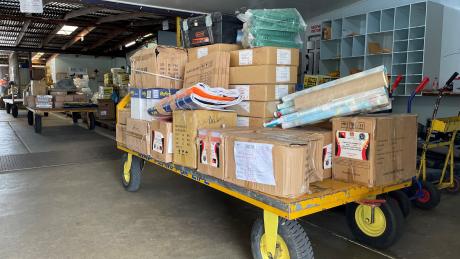
The constant need
Regularly, we are approached by those in the remote communities who let us know that MAF is their lifeline for medical evacuations, necessary supplies, and the transport of educational materials, students, and teachers. Provincial governments also understand the logistical nightmare of providing education to their rural communities. Their involvement comes through the voicing of their tremendous need for assistance – both as we meet them at their individual airstrips and by official government communication.
The benefits of investing in education
It is a statistically proven fact that restricted access to education is one of the surest ways of transmitting poverty from generation to generation. It also leads to increased maternal deaths and the rise of such diseases as HIV/AIDS. Increased education allows for increased income and gives people the opportunity to leave their rural communities and have a career outside of them, which in turn allows them to bring development into their communities and increase the standard of living. This is what we are hoping to achieve, better living standards that in turn help people become more productive so the overall development of the country can rise.
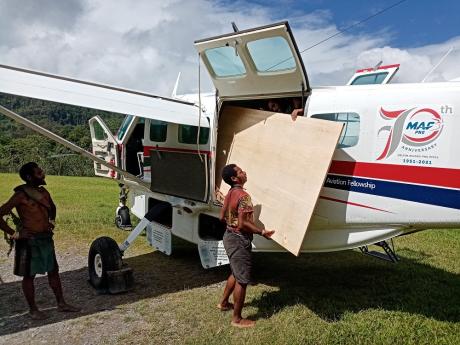
MAF supporting a school extension at Yifki
Yifki is a village situated in a remote side valley, off the major Lagaiap River valley in the highland province of Enga. New Tribes Missions (NTM) have established a vibrant church there, with many local believers. The missionary families who lived there full time have been able to leave the church in local hands, but the missionaries still have close links with the community, visiting regularly. The village school is thriving and has outgrown the current building, as they seek to extend the capacity up to Grade 8 and to respond to the local hunger for education.
Not only does this school provide access to quality education for Yifki and the surrounding villages, but more importantly, it enables children to hear the Gospel. The school is staffed by Christian teachers and runs with a Christian ethos, holding regular faith-based assemblies.
In 2022, our aircraft made multiple cargo flights from Wewak to Yifki, taking in much of the building material for the project. Work is progressing well with local labour and help from visiting NTM teams.
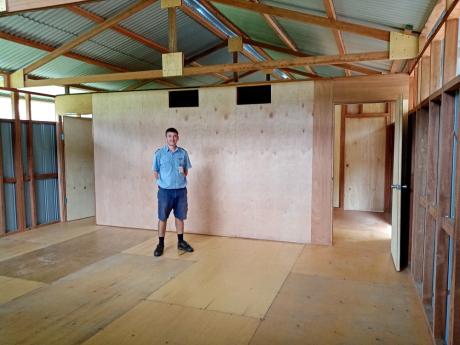
Starting a new school at Iteri
The village of Iteri is in the far west of East Sepik Province, in a valley at the foot of the Blue Mountains.
The communities of Iteri and neighbouring Nakui also previously had full-time NTM missionaries who planted indigenous churches. There are still close links between the mission and communities. NTM and Samaritan Aviation have been working together in the planning to start a school there, where, to date, there has been no education provision at all.
MAF Wewak had the privilege of flying in teams with representatives from NTM and Samaritan Aviation, plus tools and materials, so that over two multi-day visits a new classroom and office block, plus two teachers' houses, could be constructed. The community provided plenty of willing labour and put in the backbreaking work to clear the dense bush next to the airstrip where the buildings now stand.
The plan is for NTM to fund and oversee the school initially, with input and funding also coming from the local education authority.
